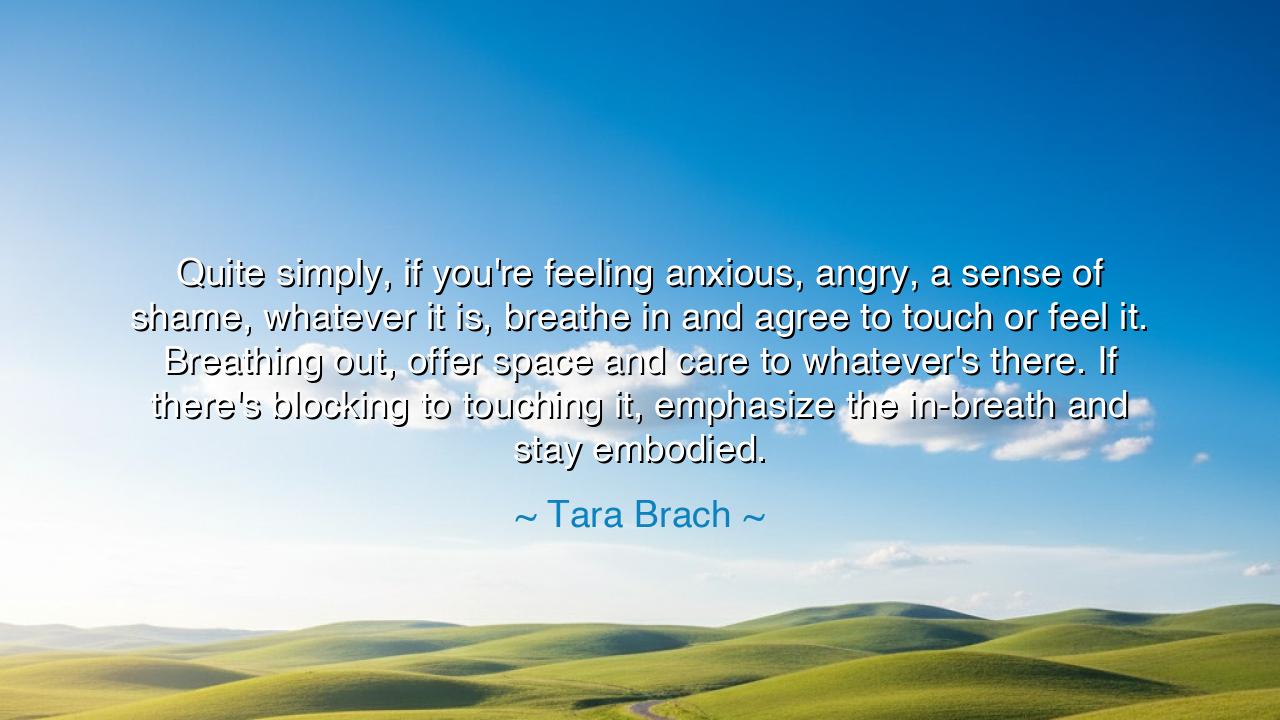
Quite simply, if you're feeling anxious, angry, a sense of shame
Quite simply, if you're feeling anxious, angry, a sense of shame, whatever it is, breathe in and agree to touch or feel it. Breathing out, offer space and care to whatever's there. If there's blocking to touching it, emphasize the in-breath and stay embodied.






Hear, O children of wisdom, the words of Tara Brach, a teacher whose understanding of the human heart speaks to the core of our struggles with the emotions that arise within us. She spoke thus: "Quite simply, if you're feeling anxious, angry, a sense of shame, whatever it is, breathe in and agree to touch or feel it. Breathing out, offer space and care to whatever's there. If there's blocking to touching it, emphasize the in-breath and stay embodied." These words, though seemingly simple, carry a profound teaching that addresses the heart of human suffering and the power of presence in the face of our emotions. Brach’s wisdom invites us to turn toward the very emotions that we often seek to avoid, to face them with care and awareness, rather than running from them in fear or resistance.
At the core of Brach's teaching lies the idea that emotions, though powerful and sometimes overwhelming, are not forces to be feared, but aspects of our being that seek acknowledgment. In the face of anxiety, anger, or shame, we are often tempted to suppress or deny these feelings, to push them away in an attempt to find relief. But Brach invites us to do the opposite: to breathe in, to fully touch and experience the emotions as they arise, rather than resisting them. By doing so, we acknowledge their presence and create the space for healing and growth. This act of acceptance allows the emotions to pass through us, like a storm that moves on once it has been fully felt and witnessed.
This idea is not new, for it echoes the teachings of the ancient stoic philosophers, who recognized that emotions, when unchecked, can cloud our judgment and lead us astray. Yet, the Stoics did not seek to suppress their feelings, but to understand and transform them. Epictetus, one of the great Stoic philosophers, taught that we must learn to observe our emotions without being ruled by them, understanding that we have the power to choose our response. In a similar way, Brach teaches that we must not push away our emotions, but rather face them with compassion and awareness, allowing them to become part of the flow of our experience without letting them define us.
Consider the story of the great warrior Achilles, whose pride and anger led him to withdraw from battle, leaving his comrades vulnerable. Achilles’ rage, though justified in his mind, consumed him and ultimately led to his undoing. Had Achilles been able to face his anger with awareness, without allowing it to dominate his actions, he might have found a way to engage with the world without falling prey to the destructive forces within him. His tale is a reminder that emotions left unchecked can cause us to lose sight of our true purpose. The path to peace lies not in the avoidance of emotion, but in embracing and transforming it through mindful presence.
Brach’s teaching also speaks to the importance of being present and embodied in the face of our emotions. In a world that encourages distraction, we often disconnect from the present moment, seeking refuge in busy-ness, technology, or escapism. Yet true peace comes from embodying the present—from feeling the sensations in our body as we experience emotions. When we breathe deeply, when we feel the tension in our muscles or the tightness in our chest, we become fully aware of what is happening inside of us. By staying embodied, we reconnect to the truth of our experience and allow it to pass through us without distortion or suppression.
The lesson Brach imparts is a call to embrace our emotions with awareness and compassion. In every moment of discomfort, we have the opportunity to respond with kindness and presence, rather than fear and avoidance. When we face our emotions—whether they are anxiety, anger, or shame—we empower ourselves to move through them with grace, to transform them into sources of wisdom and growth. Breathing in invites the emotion in, while breathing out allows us to release it, offering care and space to our own hearts.
And so, O children, take this lesson into your lives. When you feel the storm of emotion arise, rather than running from it or becoming overwhelmed, breathe deeply and turn towards it. Acknowledge it, and in doing so, allow it to pass through you. Offer compassion to yourself in these moments, and remember that the emotions you face are part of the human condition—not to be feared, but to be understood. Let this practice of awareness and presence guide you to greater peace and understanding, for in feeling fully we transform the experience, moving beyond the pain into the light of wisdom and freedom.






AAdministratorAdministrator
Welcome, honored guests. Please leave a comment, we will respond soon